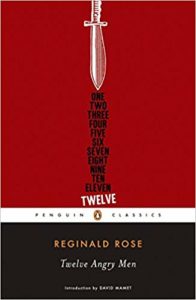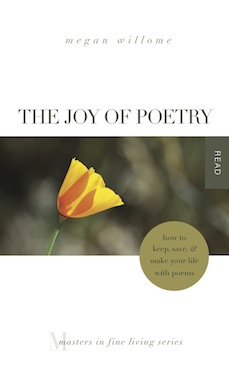The theme this month at Tweetspeak is mysteries & disguises, and if you like a good whodunnit, with all the loose threads tied into a neat bow, then you will be frustrated by the play Twelve Angry Men. We never find out if the accused, a teenage boy, is guilty or not guilty of killing his father.
The entire play takes place in the jury room, where the titular twelve angry men come together to decide the boy’s fate. The judge tells them that if they find the defendant guilty, “the bench will not entertain a recommendation for mercy. The death sentence is mandatory in this case.” At the beginning of the play, the jurors vote 11-1, guilty. By the end of the play they are unanimous in their verdict of not guilty.
The catalyst for the change is Juror 8 (none of the jurors are named). When asked by Juror 3 if his not-guilty vote means he thinks the boy is innocent, Juror 8 answers, “I don’t know.” He later reminds the men that not guilty doesn’t mean innocent — it means there is a reasonable doubt. To convict the young man, the jury has to be certain. To let him go? All they need is a little doubt.
Over the course of the play many avenues for reasonable doubt are examined and, one by one, votes are changed. Does the jury make the right decision and free the world from a killer?
6th Juror: I’m not used to supposing. I’m just a working man. My boss does the supposing. But I’ll try one. Suppose you talk us all outa this and the kid really did knife his father?
We’ll never know.
Who are these jurors? Because this story began as a teleplay in 1954, they are all white men. But they come from a variety of backgrounds, ages, education levels and professions.
6th Juror [to the 8th Juror]: Nice bunch of guys.
8th Juror: I guess they’re the same as any.
That exchange right there reflects the ideal behind our legal system’s idea of a jury. A jury is supposed to be made up of twelve people who are about the same as any other group of twelve people who might be notified at random to pass judgment on a fellow citizen.
11th Juror: We have a responsibility. This, I have always thought, is a remarkable thing about democracy. That we are, uh, what is the word? Notified. That we are notified by mail to come down to this place and decide on the guilt or innocence of a man we have never heard of before. We have nothing to gain or lose by our verdict. This is one of the reasons we are strong.
This jury, like all juries, has some members, like Juror 11, who takes the responsibility very seriously, and others who don’t, like Juror 7, who keeps whining that he’s going to miss the baseball game. Juror 12 goes with the flow of whatever everyone else thinks, unwilling to think for himself. There is Juror 10, a bigot, whose rants are still visible on various social media platforms. And Juror 3, the last holdout, is a man devastated by personal pain, which he’s never had to confront until becoming a member of this jury.
The original 1957 movie starring Henry Fonda and a bunch of other stars is a classic (the 1997 version starring Jack Lemmon and a different bunch of stars isn’t bad either). It’s been used in schools to teach students how juries work.
What I love about plays, including this one, is that almost everything is conveyed through dialogue. I enjoy letting conversation do the heavy lifting of revealing character. Give me slang, broken English, and contractions like “people’d,” and I’m a happy reader.
But plays also rely on setting to signal plot. This one opens on “A very hot summer afternoon.” There’s no air conditioning, and the fan in the jury room is broken, so the jurors open the windows. Early in act 2, a rainstorm hits, and they’re forced to close the windows, making the heat even more stifling. The fan does turn on when the light switch is flipped, but it doesn’t cool things off. It’s in that stifling environment that the two most important speeches come; one of hate, one of love. After the twelve men finally reach a verdict of not guilty, “The rain stopped.” That’s the final sentence of the play.
In Reader, Come Home, Dr. Maryanne Wolf writes, “There is fact and there is mystery when we humans enter the last milliseconds of reading the sentences before us.” This play is all about milliseconds — about what witnesses saw or heard and about what sentence of dialogue makes a juror change his vote. The verdict they deliver is fact; everything else is mystery. Except the weather.
September Pages
Finished
Poetry
The poems from L.L. Barkat’s site, Moms On Poetry
Spoon River Anthology, Edgar Lee Masters
Adult
Credo: The Rose Wilder Lane Story, Peter Bagge
The Art of the Essay, Charity Singleton Craig (Book club starts October 16, just for patrons!)
The Witch Elm, Tana French
Twelve Angry Men, Reginald Rose
* All children’s books this month read for Callie Feyen’s The Making of a Heroine workshop, except for Hank the Cowdog)
Early Readers and Picture Books
Islandborn, Junot Diaz, illus. Leo Espinosa
Bernice Gets Carried Away, Hannah E. Harrison
Wave, Suzy Lee
Dotty, Erica S. Perl, illus. Julia Denos
Middle Grade and YA
Matched, by Ally Condie
The Original Adventures of Hank the Cowdog, John R. Erickson, illus. Gerald L. Holmes (Children’s Book Club meets next Friday, October 11!)
Brown Girl Dreaming, Jacqueline Woodson (poetry, also reread)
Made Progress
Daisy Jones and The Six, Taylor Jenkins Reid
Your turn
1. What makes a good mystery?
2. Did you make some time for deep reading this month? What stories stirred your soul?
4. Share your September pages. Sliced, started, and abandoned are all fair game.
Photo by Glen Bledsoe, Creative Commons, via Flickr. Post by Megan Willome.
Browse more Reader, Come Home
“Megan Willome’s The Joy of Poetry is not a long book, but it took me longer to read than I expected, because I kept stopping to savor poems and passages, to make note of books mentioned, and to compare Willome’s journey into poetry to my own. The book is many things. An unpretentious, funny, and poignant memoir. A defense of poetry, a response to literature that has touched her life, and a manual on how to write poetry. It’s also the story of a daughter who loses her mother to cancer. The author links these things into a narrative much like that of a novel. I loved this book. As soon as I finished, I began reading it again.”
—David Lee Garrison, author of Playing Bach in the D. C. Metro
- Perspective: The Two, The Only: Calvin and Hobbes - December 16, 2022
- Children’s Book Club: A Very Haunted Christmas - December 9, 2022
- By Heart: ‘The night is darkening round me’ by Emily Brontë - December 2, 2022



Glynn says
I love “Spoon River Anthology.” I’ve loved it since I first read it in high school. Time to reread it!
And I love mystery, and mysteries. An intriguing puzzle, an engaging detective, and the reader having a fair shot at solving it are some of the elements of what makes a good one. My favorite mystery writers know exactly how to do this — Louise Penny, Ann Cleeves, Ian Rankin, and William Brodrick. I still enjoy reading the 1920s and 1930s mysteries of S.S. Van Dine and Dashiell Hammett. And one of the best historical mysteries of all time is Josephine Tey’s “The Daughter of Time” – a contemporary detective solving the murders of the princes in the Tower of London.
September reading:
Mysteries
A Better Man by Louise Penny (speaking of good mysteries!)
The Sedleigh Hall Murder by Roy Lewis
The Long Call by Ann Cleeves (a favorite writer with a new detective, but this one was a bit of a disappointment)
Grave in the Garage by Alison Golden
Death Walks Behind You by Scott Hunter
Dinner and a Murder by Nancy Skopin
Cod Beck and Other Stories by Glenn McGoldrick
Head Count by Glenn McGoldrick
Fiction
Better with You by Rachel John
The Wedding List by Autumn Macarthur
The Summer of ’76 by Ray Burston
Homecoming by Carolyne Aarsen
Wish Upon a Shell by Kay Correll
Non-fiction
The Civil War: A Concise History by Louis Masur
Queen Victoria’s Buckingham Palace by Amanda Foreman and Lucy Peter
The 21: A Journey into the Land of the Coptic Martyrs by Martin Mosebach (my deep read for the month)
Poetry
Your Daughter’s Country by John Dorsey
And After All by Rhina Espaillat
Soft Launch by Aaron Belz
Faith
Book of 1st Samuel
Megan Willome says
Glynn, I so enjoyed talking about Spoon River with you on Twitter. I’m going to use one for a By Heart selection sometime this spring.
Putting Josephine Tey’s “The Daughter of Time” on my list. I was disappointed in “The Witch Elm” (see above)–I didn’t think the end meshed with the setup in the beginning.
My husband tells anyone who will listen that if they want a great page-turner, they can’t go wrong with 1 and 2 Samuel.
Glynn says
First Samuel, written some 3,000 years ago, has a solid, recognizable grasp of human nature.
L.L. Barkat says
This is an interesting pick at just this moment in time. I am thinking the central issue is the idea of exchange.
What makes us exchange one mindset (verdict) for another?
(This play went guilty >> not guilty. What does it take to go not guilty >> guilty?)
Also, the idea of somehow struggling with the mystery that is placed before us, which is not always fully a mystery but cannot necessarily ever be understood in its entirety. In this regard, I wonder about the rain and what it might say beyond its own reality. Do we feel the difference between when we are dry and when we are wet… and does that have anything to add to how we deal with other kinds of information?
I am dearly looking forward to December 31, when I will gift myself book reading again. What book, what book. I don’t know.
Megan Willome says
I can’t wait to hear what you choose.
One of the refrains in the play is “It’s possible,” as in it’s possible that things aren’t as clear cut as they seem. Even things that seem obvious, like the knife, come into question.
As to rain, it means something different when it’s scarce. I’ll write about that when I write about Joy Harjo, probably next month.
L.L. Barkat says
Oh, and, btw… I laughed out loud at your observation about how we can still see the rant guy on social media. You are so quietly funny.
That brought up an interesting further question for me:
when we are trying to engage in determining “reasonable doubt,” how does it influence us when there is unreasonableness (especially ranting) in the room? 🙂 Does the play delve into this in an interesting way?
Megan Willome says
It’s one of the key scenes, how the other eleven jurors react when he goes from racist asides to an all-out rant.